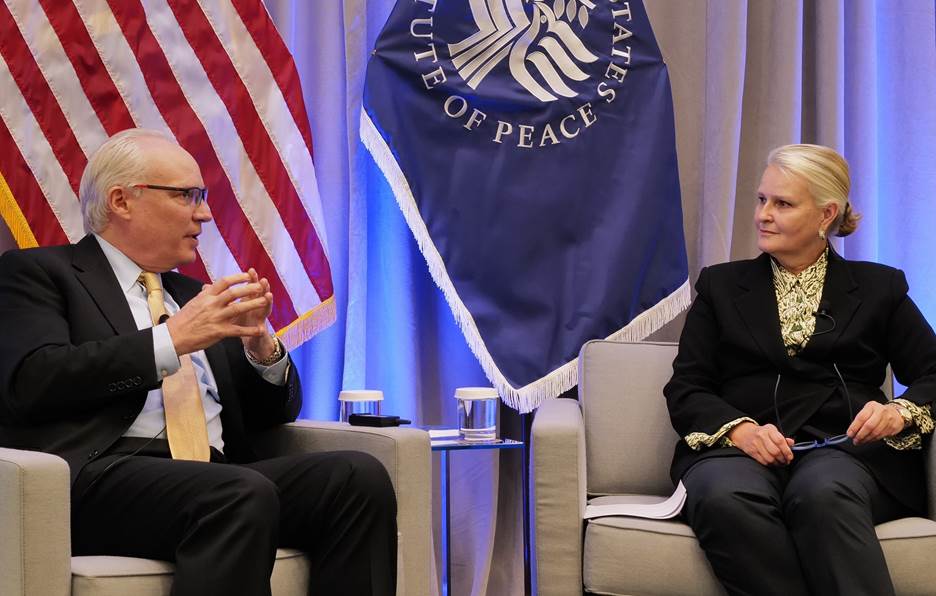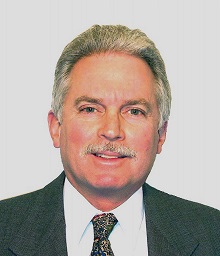

US Special Envoy to Yemen Tim Lenderking and moderator USIP President and CEO Lise Grande
Yemen, Oil and American Soft Power
Report and photo by Phil Pasquini
Washington, DC

Washington: While the world’s attention is presently focused on the war in Gaza and Israel’s looming invasion, accompanied by the prospect of more innocent lives being lost on both sides, Yemen, that has endured a war now in its ninth year, recently had one success in averting a disaster.
Since the Yemeni war beginning in 2014, the Yemen Exploration & Production Company’s now 45-year-old, super tanker Safer, a 1,150-foot vessel used as a Floating Storage Offload (FSO) facility had been anchored along Yemen’s Red Sea coast north of the port of Al Hudaydah storing oil pumped from the Marib region of the country. She received oil through Yemen’s main Marib-Ras Isa oil pipeline from a refinery 272 miles inland to the shore where a 4.8-mile underwater pipeline completed the final link to the vessel.
The ship’s condition had since deteriorated significantly due to the lack of maintenance and upkeep posing the very real probability of its either exploding, sinking, leaking or breaking apart that would have resulted in a major oil spill four times that of the Exxon Valdez in 1989.
A disaster of that scale would have destroyed one of the world’s largest ecosystems and resulted in billions of dollars of loss and untold ecological, economic and humanitarian damage to the entire region all along the pristine Red Sea coastline.
With a total capacity of 3.1-million-barrels, the ship’s remaining cargo of 1.1 million barrels (46.2 million gallons) of oil was successfully offloaded in August, thus, averting a disaster. In no small way that was due to an unusual effort on the part of many different parties coming together and uniting in working on a positive outcome.
On October 24 at the United States Institute of Peace (USIP), US Special Envoy to Yemen Tim Lenderking and moderator USIP President and CEO Lise Grande discussed a behind-the-scenes look at that success and how “innovative diplomatic” approaches utilized in resolving the FSO Safer issue could be used along with “American soft power” and diplomacy in innovative ways across the Middle East in ending conflicts that heretofore have remained unresolved.
In her opening remarks, Grande indicated the unusual combination of those participants including “enemies who were at war with each other, multiple stakeholders and tens of thousands of environmentalists who among other things crowd sourced enough funds to pay for this operation.” The delicate operation of transferring the oil to the ship, Nautica, was made possible through creative diplomatic efforts led by US Special Envoy to Yemen, Tim Lenderking.
In response to an opening question regarding the war between Israel and Hamas and regional implications, Lenderking began by speaking about the positive developments in Yemen and opined that “While far from perfect and far from over, Yemen has an opportunity for peace. And it must be seized… The Safer case in point without the conflict parties themselves being willing to talk to each other and problem solve” would not have been resolved and, “that thread really must be pulled on. And when Yemen is facing and the region is facing the kind of challenge with what’s going on in Gaza, it is particularly important.”
The efforts to offload the Safer began with the US government putting up $10 million as seed money and in working with the UN, private sector oil companies, environmentalists, a broad coalition of international actors and Maryland school children who helped raise money to pay for the project, all of whom were focused on efforts to avert the potential disaster. The UN purchased the ship Nautica to offload the oil onto and after its arrival, the ship was renamed the Yemen and handed over to the Houthi’s on July 16 before the offloading began.
In orchestrating those efforts, he went on to say that “We didn’t do a lot of naming and shaming, but we inspired a lot of countries to come forward, because so many countries benefit and participate in world commerce through the Red Sea.” He mentioned the leadership role that the Dutch played in the project and went on to say that an important message for everyone was that “When you can motivate a coalition like this you can actually prevent a problem from becoming a crisis.”
Lenderking iterated how after some initial confidence-building between the parties had been achieved, both sides during a truce wanted to give diplomacy a chance to resolve the highly potential Safer disaster. The momentum for resolution began with the signing of a memo of understanding between the Yemeni government and the Houthis.
Speaking on the Israel and Gaza war, Lenderking said that Secretary Blinken told him that despite all the conflicts the US is presently involved in that “We have to keep Yemen diplomacy going.” And that after his most recent trip to the region where he visited Saudi Arabia and Oman “Gaza came up in every single conversation. There’s no question that the Yemenis feel very passionately about what is going on. We all feel the impact of the loss of life that is taking place and that is inexcusable from either side to perpetuate.” Going on to indicate that peace is now at risk [in Yemen] with the continuing Gaza problem.
“I think it was very unfortunate that the Houthis decided to launch missiles and UAVs last Friday towards Israel,” Lenderking said. “My worst fear of course is that Yemen gets dragged into another war. And this war [in Yemen] is not over yet, so there is no patience and no tolerance to see this happen. What we want to do is move to a better place in Gaza, so it is less emotional for everybody concerned.”
He went on to say that the Russians and Chinese want a political solution, they do not want a military solution in Yemen while it continues to be important that contacts, relationships and discussions be retained to achieve that goal.
Lenderking remains hopeful that the UN will engage in peace talks in Yemen and take over that effort to achieve two goals: a durable ceasefire and more comprehensive and inclusive peace talks which include Yemeni women and civil society, and result in a sustainable political solution.
“That is the most important thing we can do…to find a way to bring the Yemenis back together in one place with their leaders negotiating the future of their country,” he said. “And that is what the United States is committed to. Yemenis know what to do, so let’s get them together so they can make the decisions about their country.”
While the Safer disaster has been averted with the successful transfer of the oil from the ship, a statement by Secretary of State Antony Blinken shortly afterward on August 11, reflected that to complete the project “The UN urgently needs the international community and private sector’s financial support to fill the remaining $22 million funding gap needed to finish the job and address all remaining environmental threats.”
“This operation serves as a strong model for future international coordination and cooperation to proactively prevent crises before they occur.”
(Phil Pasquini is a freelance journalist and photographer. His reports and photographs appear in the Washington Report on Middle East Affairs and Nuze.ink. He is the author of Domes, Arches and Minarets: A History of Islamic-Inspired Buildings in America.)

